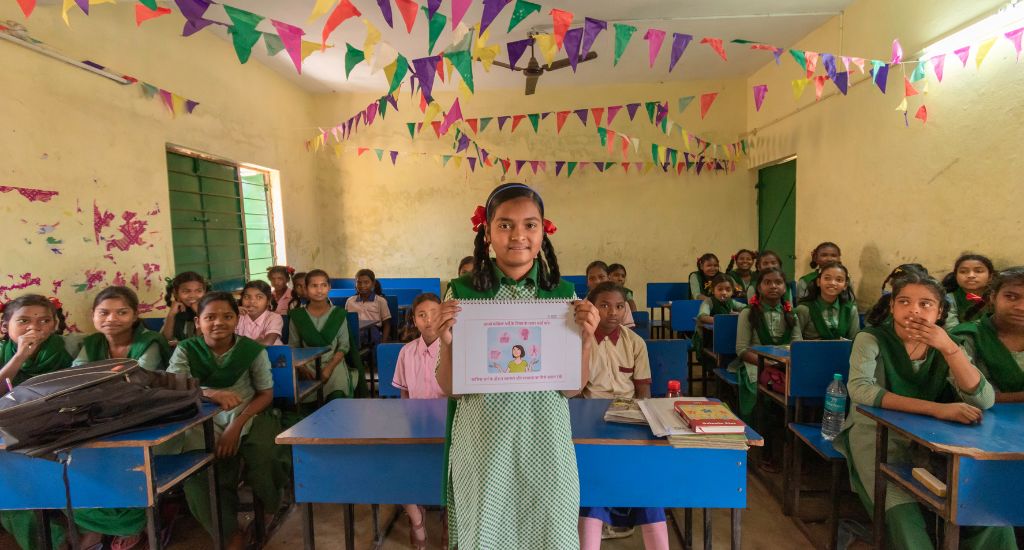
Fostering menstrual health and women’s empowerment in rural India
Providing education, affordable products and fostering a supportive environment can go a long way to empower women and girls, and break taboos around menstrual health.

Providing education, affordable products and fostering a supportive environment can go a long way to empower women and girls, and break taboos around menstrual health.
In the quiet corners of Bihar, Jharkhand and West Bengal, a transformative journey is unfolding, reshaping the lives of women and girls. The Menstrual Health & Hygiene Support & Awareness programme run by Karuna-Shechen India is at the heart of this change, challenging deep-seated taboos and empowering communities with vital knowledge and resources.

The programme’s impact in Bihar has been huge. Throughout 2023, as many as 678 awareness sessions reached 5,442 girls, while 4,125 women participated in sessions held at anganwadi centres and villages. Distribution of more than 1.53 lakh sanitary napkins and 345 cloth pads has provided a tangible means for improved menstrual hygiene, fostering healthier practices and reducing infection risks. Each session transforms into an educational opportunity, ensuring that every recipient understands the proper use and benefits of these products.
In the neighbouring state of Jharkhand, the outreach encompassed 19 awareness sessions with 404 women. Additionally, 1,295 women and 390 girls engaged in menstrual hygiene sessions in anganwadi centres and villages, while school sessions across 29 institutions involved 1,565 girls. The distribution of over 1.75 lakh sanitary napkins has positively impacted 15,490 individuals, enhancing their ability to participate in daily activities without the hindrance of menstrual health issues.

The Darjeeling region in West Bengal has also seen significant engagement, with 13 staff members and 69 volunteers trained on menstrual health and hygiene. Awareness sessions have reached 2,582 women and girls in villages and 1,871 girls in 40 schools, with the distribution of over 1.25 lakh sanitary napkins. The comprehensive training provided to staff and volunteers ensures the programmeme’s sustainability, enabling continuous support and education within the community.
One of the most critical aspects of Karuna-Shechen India’s initiative is easy accessibility of sanitary products. By offering sanitary napkins at a minimal cost of Rs 2.50 per pad, the programme has provided lakhs of pads to thousands of beneficiaries. This not only addresses the material needs of women and girls but also promotes safer menstrual practices.

The distribution sessions are meticulously designed to be more than mere handouts. Trainers provide detailed explanations on the proper use of sanitary napkins and cloth pads, ensuring that recipients can use these resources effectively. This hands-on approach fosters a sense of empowerment and independence among the women and girls.
Education lies at the core of this programme. By informing women and girls about sustainable menstrual practices, Karuna-Shechen India promotes long-term health and environmental benefits. The interactive sessions in schools and villages are tailored to be engaging and relevant, breaking the silence and dispelling myths surrounding menstruation.

Trainers begin by assessing participants’ existing knowledge and addressing biases and beliefs. They create a comfortable learning environment through ice-breaker activities and sharing personal menstrual stories, encouraging participants to share their experiences and ask questions. This openness fosters trust and engagement.
A significant part of the education focuses on dispelling myths and misconceptions. By providing logical and scientific explanations, trainers tackle taboos head-on, promoting a better understanding of menstruation as a natural biological process, free from stigma.
Participants learn about the menstrual cycle, hygiene, and methods to manage menstrual discomfort, including home remedies, yoga poses, and nutritional tips. This comprehensive education empowers women and girls to take control of their menstrual health and make informed choices.
The programme extends beyond individual education, fostering a supportive community environment. Focus group discussions create spaces for women and adolescent girls to share experiences, challenges and insights. These discussions facilitate mutual learning and reinforce the programme’s objectives through community engagement.

As sessions progress, a notable change occurs. Participants, initially hesitant, become more engaged, often discussing their newfound knowledge with their families. This ripple effect extends the programme’s impact beyond the sessions, fostering wider community awareness. Feedback gathered after three months reflects significant improvements in menstrual practices and positive community changes.
Karuna-Shechen India’s holistic approach includes thorough staff training, logistical arrangements and a staged exit strategy to ensure sustained impact. By equipping communities with the knowledge and resources to manage menstrual health, the programme ensures long-term benefits, promoting open discussions and reducing stigma.
The experiences of women in these communities underscore the importance of breaking menstrual taboos. By understanding their bodies better, they take control of their health and well-being, paving the way for a more informed and empowered society. The success of Karuna-Shechen’s programme is evident in improved health outcomes, enhanced educational achievements and societal shifts towards greater acceptance and understanding of menstrual health. Through these efforts, a brighter, healthier future is within reach for women and girls in rural eastern India.
The lead image on top shows an awareness session on menstrual health and hygiene being conducted at a school in Jharkhand. (Photo by Anirban Ranjit, Livelihood Coordinator, Karuna Shechen India)
Anisha Roy, Lead – Monitoring, Evaluation and Learning, Mlinda Charitable Trust, was earlier working as MEAL Officer, Karuna Shechen India.